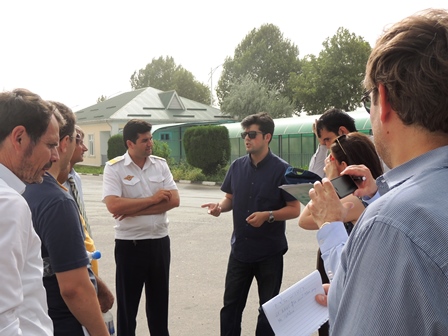
Senior trade and customs officials from Azerbaijan, Kyrgyzstan, Tajikistan, and Turkmenistan (countries participating in the UN Special Programme for the Economies of Central Asia known as SPECA) received practical advice on the implementation of trade facilitation at a training workshop co-organized by UNECE and the Organization for Security and Co-operation in Europe (OSCE) in Dushanbe.
Particular attention was paid to the implementation of the World Trade Organization’s (WTO’s) Trade Facilitation Agreement in the region; the establishment of National Trade Facilitation Committees; and the development of a roadmap for implementing comprehensive trade facilitation reforms. These reforms are meant to support governments’ efforts to reduce delays at border-crossings and speed up customs clearance, transit, import, and export procedures. Participants also learned about the development of Authorised Economic Operator programmes and tools aimed at improving inter-agency cooperation, both domestically and internationally.
This interactive and practically-oriented workshop aimed at equipping participants with knowledge about the array of tools and approaches contained in the UN Trade Facilitation Implementation Guide and how to use them for the simplification and harmonization of international trade procedures.
“This workshop enabled participants to exchange national experiences and explore the scope for closer co-operation at the regional level. Trade facilitation is a key aspect for the economic development of Central Asia,” said Martin Rossmann, Senior Economic and Environmental Officer at the OSCE Office in Tajikistan.
Roel Janssens, Economic Adviser at the OSCE Secretariat said: “Landlocked developing countries, in this region, and elsewhere, face higher trade transaction costs due to the complexities of multimodal transportation and the multiple border-crossings, transit arrangements and documentation requirements involved”. “The challenge for countries along Euro-Asian trade corridors is to turn this geographical challenge into an opportunity”.
Mario Apostolov, Regional Adviser at the UNECE said: “Trade facilitation is not the responsibility of one agency, it can only be successful when a ‘whole of government’ approach is adopted. This is the approach reflected in the WTO Trade Facilitation Agreement and the United Nations Centre for Trade Facilitation and Electronic Business (UN/CEFACT), which looks at trade facilitation along the entire supply chain, where customs and border authorities, trade and transport ministries as well as the private sector and other relevant actors coordinate their tasks, conduct joint controls and exchange documents and data.”
On the second day of the workshop, the participants paid a study visit to the Tursunzade border crossing-point between Tajikistan and Uzbekistan where they could observe, first hand, both progress and challenges in regional trade facilitation.
The workshop was organized by the OSCE Office in Tajikistan, the UNECE Economic Cooperation and Trade Division and the Office of the Co-ordinator of OSCE Economic and Environmental Activities, at the Border Management Staff College in Dushanbe.
For more information, please contact:
Mario Apostolov
Regional Adviser, Economic Cooperation and Trade Division, UNECE
E-mail: [email protected]

